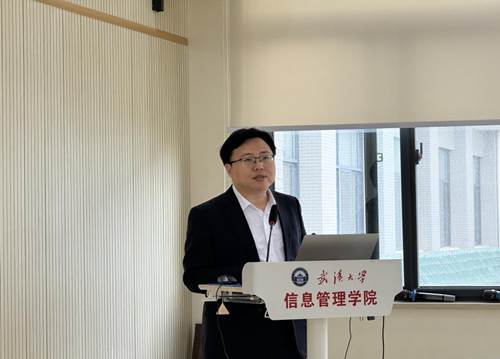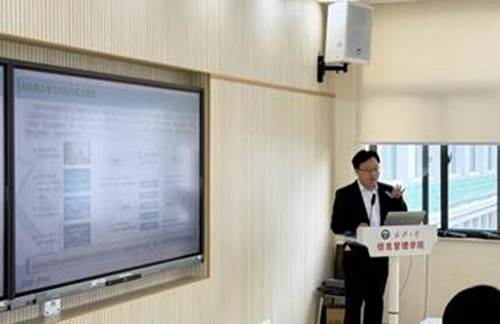To deeply explore the development trends of knowledge services in the artificial intelligence era and promote exchanges between academia and industry in the fields of artificial intelligence and knowledge engineering, the special lecture The Construction Practice and Exploration of Tongfang CNKI's Chinese Knowledge Large Model was held in Meeting Room 412 of the school on the morning of April 10th. The lecture was delivered by Xin Cheng, Manager of the Product Department of Tongfang CNKI, hosted by Han Zheng, Associate Professor at the school, and attended by more than 50 teaching staff and students who actively participated in the interaction.

This lecture focused on the construction concepts and technical pathways of knowledge-oriented large models, aiming to help teachers and students systematically understand related cutting-edge developments and guide students to combine theoretical knowledge with industry practices, deeply reflecting on the integration of professional learning and future career development.
At the beginning of the lecture, Xin Cheng introduced the profound changes experienced by the knowledge service industry under the impetus of the generative artificial intelligence wave, combining Tongfang CNKI’s years of development experience. He pointed out that as artificial intelligence evolves from "perception" to "cognition" and from "discriminative" to "generative," the organizational methods, generation mechanisms, and verification pathways of knowledge are being redefined. In his view, issues such as low credibility, high hallucination rates, and lagging knowledge updates are common challenges that the knowledge service industry needs to address urgently.
To solve these problems, Xin Cheng introduced that Tongfang CNKI, relying on its long-term advantages in authoritative knowledge data, professional content accumulation, and domain modeling, jointly launched the Chinese Knowledge Large Model (abbreviated as Huazhi Large Model) with Huawei. Different from general-purpose large models, the Huazhi Large Model focuses on knowledge service scenarios, adopts a fusion strategy of "industry knowledge + business knowledge," emphasizes scene adaptation and professional semantic understanding in vertical fields, and focuses on enhancing three core capabilities: generation, interaction, and migration. During construction, the model undergoes pre-training based on high-quality and diverse training data and is continuously refined and optimized through experts’ feedback, gradually forming a professional large model system covering more than 30 general capabilities and 12 characteristic capabilities, with the practical application potential to embed industry systems and support complex tasks. Xin Cheng’s systematic explanation of the construction concepts and technical pathways of the Huazhi Large Model not only broadened the theoretical horizons of teachers and students but also strengthened their thinking ability to apply professional knowledge to real-world problems.
Subsequently, Xin Cheng further introduced how the Huazhi Large Model co-creates vertical industry ecosystems with users. In specific practices, Tongfang CNKI invites users to deeply participate in functional design and application testing through collaborations with universities, research institutions, etc., transforming them from "users" to "co-builders," thereby promoting the deep integration and implementation of knowledge-oriented large models in multiple fields such as education, scientific research, and government affairs.
Next, focusing on the scientific research scenario, Xin Cheng and his colleague conducted a live demonstration of the CNKI AI Academic Research Assistant developed based on the Huazhi Large Model. This tool covers multiple links throughout the scientific research process, including intelligent question-and-answer, literature mind map generation, research outline construction, similar literature viewpoint comparison, and other functions, aiming to provide efficient support for academic research and advance scientific research toward intelligence. Tongfang CNKI has also specially opened a trial for faculty and students of Wuhan University, through which they can obtain inspiration and support more efficiently in key links such as topic selection, literature review, and research design with the tool’s professional knowledge services.

At the end of the lecture, teachers and students engaged in a lively discussion on knowledge source organization, data standards, copyright issues, and practical application scenarios in large model construction. Xin Cheng stated that Tongfang CNKI will continue to promote cooperation and welcomes students from Wuhan University’s School of Information Management to participate in related internships and projects, jointly exploring the future of intelligent knowledge services.
This lecture not only helped teachers and students deepen their understanding of the integration trend between artificial intelligence and knowledge services but also built a powerful platform for the school’s talent cultivation and industry-university-research collaborative development in interdisciplinary fields.